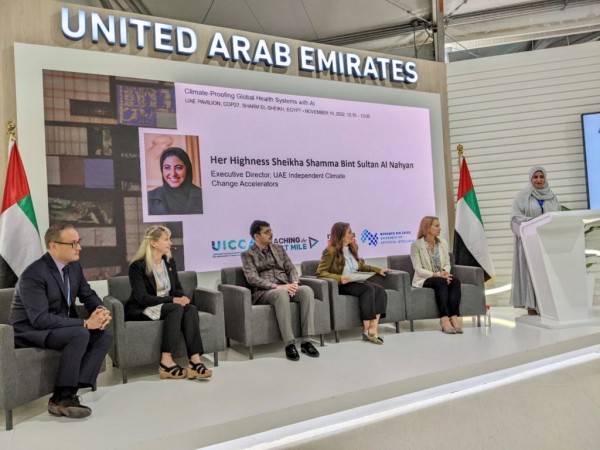GEOG Researchers Share Their COP27 Experiences
Leaders, policymakers, and scientists from all over the world recently convened for climate negotiations at the United Nations’ 27th annual climate change conference—commonly referred to as the “Conference of the Parties” (COP27)—in Sharm el-Sheik, Egypt. Among them, in-person and virtually, were three researchers from the Department of Geographical Sciences: Tatiana Loboda, George Hurtt, and Molly Brown.
“You get the sense that the world sees climate change as an issue of great importance—across public and private sectors and in all regions of the world. The rest of the world has moved so far past ‘recognizing’ that it is a problem and into ‘identifying vulnerabilities’ and ‘developing solutions,’” reflected Loboda, Chair of the Department of Geographical Sciences and first-time COP attendee. “The most striking thing for me was that this message had so many voices—youth organizations, indigenous communities, governments, NGOs, private sector, international organizations—and all people who participated believed that their actions and words really matter.”
Loboda attended the conference on behalf of Malaria No More, a non-profit dedicated to eradicating malaria. The organization—in partnership with the Reaching the Last Mile Initiative, a portfolio of global health programs working towards disease elimination that is driven by the personal commitment of His Highness Sheikh Mohamed bin Zayed, President of the United Arab Emirates—hosted a panel session centered on making global health systems resilient to climate change.
Drawing on her expertise in using satellite observations to forecast malaria outbreaks in the tropics, Loboda focused her part of the panel discussion on how Earth observation data can be further used to “climate proof” global health systems.
“The amount of data that we have from satellite observing systems is just incredible … what we have is complete global coverage from some systems every few days and from other systems almost daily,” said Loboda, referencing data that includes land surface changes, human activity and malaria outbreaks. “This deluge of data really is a phenomenal resource, but it also brings challenges in terms of how do we take advantage of all this information that is coming our way?”
Loboda wasn’t the only GEOG researcher to participate on a panel. For the second year in a row, Distinguished Scholar-Teacher George Hurtt participated in the conference as a delegate on behalf of the Universities Space Research Association (USRA), and spoke on a virtual panel about using next generation Earth observation technology to monitor and guide climate mitigation efforts in support of the Paris agreement. Hurtt also contributed to the 2022 Global Carbon Budget, a key annual report on trends in global carbon emissions, which was unveiled at the conference.
GEOG Research Professor Molly Brown likewise attended her second COP representing her agricultural technology company 6th Grain. She spoke at a side event titled “Leveraging artificial intelligence and machine learning to accelerate smallholder adaptation,” presenting 6th Grain’s tools for smallholder farms, which transform weather data into decision-support tools for smallholder commercial tomato farmers.
Though unable to attend the conference itself, Associate Research Professor Catherine Nakalembe led the development of a United Nations Framework Convention on Climate Change (UNFCCC) guidance document on adaptation to climate change for Least Developed Countries (LDCs) and Small Island Developing States (SIDS) that was launched during COP27.
“There is a diverse and truly global community of experts who have a tremendous combined potential to ensure that our future under the projected climate change scenarios is not disastrous,” concluded Loboda. “The biggest challenge is how to get the right people to the table for every specific discussion and negotiation.”
Watch Loboda’s panel discussion here and Hurtt’s panel discussion here.
Image courtesy of Malaria No More.
Published on Thu, 12/01/2022 - 09:17


